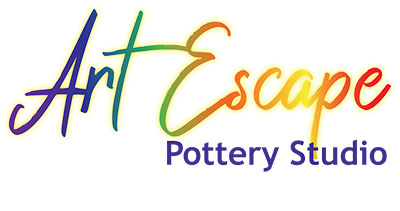There are probably as many reasons to learn how to make pottery as there are people on the planet.
If you are like most people who searched for, “Pottery classes near me,” you’re probably interested in finding pottery lessons either to learn how to throw on the wheel or, how to hand-build pottery.
Below are 101 ways that taking pottery lessons can improve your life. Take the time to read through and follow the links for more in-depth articles as take a deep dive into the mud. Enjoy!
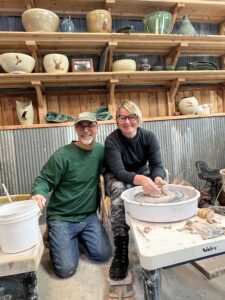
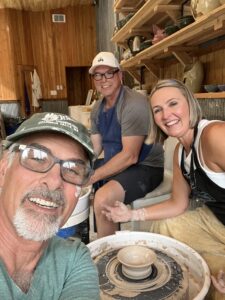
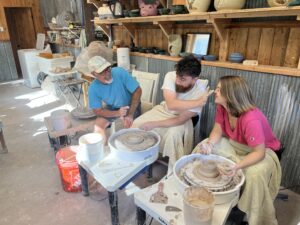
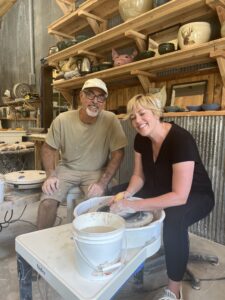
Creativity Unleashed: Express your unique artistic vision. When you learn how to throw on the wheel by taking a pottery lesson, you won’t instantly be a master potter. As you become more practiced in pottery, you won’t have to think so much about how to thrown on the wheel, instead, you can focus on your new creation.
Stress Relief: The rhythmic motion can be therapeutic. Even new students who take a beginners pottery lesson can often feel a deep level of stress relief that often lasts for days.
Mindful Focus: Enhance concentration and mindfulness. In this fast world of ours, people are used to pushing a button and having their widget delivered to their door. when people don’t use much their ability to concentrate, that ability shrinks. When you are learning how to throw pottery on the wheel, you will be focusing for long periods of time. During this time, you might find yourself dropping into a groove that most people don’t experience in modern times.
Fine Motor Skills: Improve hand-eye coordination. Taking a pottery lesson one time might not do much for your coordination but if you stick with it, you will find your fine motor skills improving throughout time.
Sculptural Mastery: Learn to shape and mold 3D forms. You’ll never know how much artistic talent you have until you try. The idea is to have fun while you practice.
Patience Development: Each piece requires time and care. If you can find a pottery class near you, you’ll have a great opportunity to develop your ability to be patient with yourself.
Camaraderie: Connect with fellow pottery enthusiasts. One reason that so many people search for pottery classes is for all the fun they will have with all their new friends. The women are all chatting it up while the men have their own way of being together.
Functional Art: Create usable, beautiful pottery. When you use the handmade cups and bowls and plates you make in pottery class, you won’t be sad that they aren’t perfect, no, you will love them more and more as time goes by. After a few years, the pottery you make will become some of your most special possessions.
Personalized Gifts: Craft heartfelt presents for loved ones. There’s nothing wrong with buying a factory-made cup as a gift however, when you take the time to make it yourself, your friends and family with treasure the handmade pottery that you give them.
Problem Solving: Develop creative solutions for challenges. Not only will you be solving artistic problems as you learn in your pottery class, you will also find yourself working through other issues in your quiet time.
History Appreciation: Connect with the rich tradition of pottery. Every ancient culture around the world has found that after a fire, the clay has turned to something like glass.
Therapeutic Release: Channel emotions into your creations. With some intention to let go of what bothers you, the time you spend in the pottery studio can be very cathartic. Learning to work on the pottery wheel can be especially good for your mental health.
Sense of Accomplishment: Witness your skills grow. When you start your learning journey, you won’t be a master. Obviously, right? But that doesn’t stop people from getting frustrated in the beginning. This is why I teach that the most important part of learning is to have fun. The more fun you have in the learning how to to make pottery, the more you will want to practice, the more you practice, the better you’ll get. Before you know it, you’ll be proud of your creations.
Community Engagement: Participate in local art communities. In today’s world of online forums, Facebook, Twitter and other social media sites, you never get the chance to make actual friends like back in the old days. Getting yourself involved with a local pottery studio can open up a whole new world of friendships.
Meditative Process: Enter a calming and meditative state. Imagine how meditative it becomes when you are sitting at the pottery wheel. If this is what you’re looking for, you’ll find that you can fall into a deeply relaxed place.
Contribute to Culture: Add to the legacy of ceramic art. Deep down, most good people want to leave a legacy of goodness behind when they’re gone The simple cup you make today may be someone’s prize possession in a hundred years from now. Your future generations can be enjoying your handmade cups, plates, bowls, and other ceramic arts.
Multi-sensory Experience: Engage touch, sight, and sound. One of the great ways that taking pottery lessons can improve your life is how fully immersive it can be. When your sense of touch and sight merge with the music, you can truly find yourself by losing yourself.
Portfolio Building: Showcase your evolving body of work. By sticking with your practice of building your pottery skills, your earliest endeavors may become your most precious works of art but that is just the beginning. As time passes, your skills to produce finer pieces will increase. Having a special shelf in your home that showcases your progression will add a delightful insight into your human-ness.
Environmental Awareness: Appreciate the nature of clay. Clay is old. Imagine how long it takes for a mountain to wash down to the rivers, leaving sand in some places and clay in others. It’s our responsibility to use clay wisely and not destroy the environment while mining for it.
Custom Home Décor: Design pieces to complement spaces. Having your own handmade tissue box in the bathroom and a flower pot in the living room and a fruit bowl in the dining room will make your home uniquely your own. You have an infinite amount of creativity and pottery is the perfect material to use in order to express yourself in your own home.
Personal Retreat: Pottery as a personal escape. Your own pottery studio in your own home can be a sanctuary. Your community pottery studio can serve the same purpose. Imagine having a place where you can get away from all the stuff of your own life and just create!
Innovative Thinking: Encourages thinking outside the box. Whether you are designing your own fountain or a lamp or perhaps something simple like a butter dish, your mind will be transported to a new dimension where thinking outside of the box will become more natural.
Material Connection: Understand the properties of clay. The more you know about the different properties of clay, the more you can do. When you add in all the different properties of glaze, the possibilities are endless. This is a field of study where more than a simple pottery lesson will be required if you want to become an expert potter.
Resilience Building: Embrace imperfections as part of art. Building resilience is all part of the process. As part you your learning process, you really need to be able to say, “Oh well!” And move on. Go ahead and try again., That pot you made can be used to make a different piece after you reclaim the clay.
Cultural Exploration: Explore various pottery traditions. Here’s something interesting. Go down the rabbit hole and learn about all the different ways that different cultures make and use their own pottery. Then, if you’re up for it, try to re-create it in your own pottery practice.
Unique Dinnerware: Craft one-of-a-kind plates and bowls. If you’re like most studio potters, you’ll soon have your cupboards filled with your own handmade pottery. There are special classes for potters who want to make unique dinnerware.
Memory Creation: Attach memories to your creations. There are many ways that you can put photos on mugs. We’ll address that in a little while.
Nature-Inspired Art: Draw inspiration from the environment. You may be inspired to make bowls like look like leaves or other natural ideas. Here’s a link to fountains make to look like they just came out of a jungle.
Physical Exercise: Engage muscles in the throwing process. Not only will doing pottery help you stay in shape, but you may find yourself going out of your way to become stronger so that you can throw large pottery.
Attention to Detail: Develop a keen eye for precision. Some people already have an eye for detail, other people need to work on it for some time. Either way, the more you practice what you learn in a pottery lesson, the better you will become at being detail oriented.
Adaptability: Adjust techniques to varying clay types. Whether you are making fine china from porcelain or heavy planters from stoneware, you will learn different principles and techniques to suit your needs. Ask your pottery teacher when you are ready to try new things.
Inspiration Network: Connect with other potters for ideas. This is where the internet really shines. Check out Facebook groups, Pinterest, and other social platforms to get inspired from literally millions of other ceramic artists. When you find something you are interested in, ask your pottery teacher to show you how to make it yourself.
Appreciation for Craftsmanship: Understand the value of handmade. Being that nearly every master potter begins her career as a disaster, you will gain a level of respect for the masters very quickly. You’ll realize that there’s so much to learn about becoming a potter!
Sensory Exploration: Feel the texture and moisture of clay. Some people are highly visual, others are auditory, then there’s the rest of us who experience the would through our kinesthetic sense of touch. In a way, it’s a break from other parts of life for you to just focus on what clay feels like. It’s a real treat.
Portfolio Diversity: Expand your repertoire of forms. Are you more interested in making short and wide planters? How about tall and skinny vases? Perhaps something in between? Whatever shapes you are interested in, taking pottery lessons will set you on your way towards it.
Financial Independence: Potential to sell your creations. Some people never want to sell anything. They are satisfied to be a hobby potter. Others set their sites on becoming a professional potter.
Experimentation: Try new glazes, shapes, and firing methods. Regardless of how experienced you become as a potter, you will want to continue to experiment with different clays, firing times, glazes, and techniques.
Mind-Body Connection: Harmony between hands and mind. Just like your foot automatically knows how to slow down when driving past a group of kids, your hands will learn how to create what you visualize.
Cultural Exchange: Learn from diverse pottery traditions. Traveling to different countries takes you on a different pottery journey. Going to places like India, Mexico, China, Thailand or a thousand other cultures can take you to a whole new level of experience when you to to learn more about their pottery techniques and styles.
Color Play: Experiment with vibrant glaze combinations. There are as many color variations as there are colors. Whatever color you conceive of can be recreated in your pottery class.
Artistic Legacy: Leave behind a collection of your art. Your children, grandchildren and beyond will have something to remember you by.
Infinite Possibilities: The potential to create anything from clay. Whatever you can visualize in your mind, you can create with clay. Okay maybe there are some limits to what you can do with as a potter but I think you get the point.
Mindful Observance: Observe the transformation of raw clay. The way clay transforms from raw mud to a finished and vitrified work of art is truly mind-blowing.
Individual Expression: Convey your personality through art. From day to day, even from hour to hour, your pottery inspirations can change, along with the way you express yourself.
Celebration of Imperfection: Embrace the beauty of uniqueness. Perfect symmetry rarely exists in nature. Check out Wabe Sabe for some perfectly perfect imperfection.
Nature Appreciation: Gain a deeper respect for the earth’s elements. Clay is made from minerals in different ratios. Even slight differences affect the final outcome.
Art Therapy: A form of self-expression and healing. Sometimes the most healing place in the world can be in the pottery studio. Creating an environment that supports wellbeing makes healing come naturally.
Curiosity Fueled: A continuous exploration of techniques. As you dive deeper into your artistic journey, learning new techniques will keep you interested.
Intuitive Creation: Trust your instincts in the creative process. Some people like to start with the end in mind, others enjoy the process of not knowing where they are going and instead, allow their intuition to take the lead and see where they end up.
Practical Skills: Knowledge of firing, glazing, and finishing. There are many aspects of learning to become proficient at being a potter. Along the way you’ll need to learn about how to fire your pieces in a kiln, how glaze reacts in different ways, finishing your pieces and more.
Symbolism Crafting: Infuse symbolism into your work. Sometimes words just don’t cut it. In these times, a simple symbol may be just the thing. If you have an idea you’d like to explore in your pottery class, ask your teacher.
Mind-Relaxing Routines: Rituals in the pottery-making process. Walking into a relaxing environment like Zen studio is very different than walking into your neighborhood community class. Some people adjust easily, others will need some rituals to help their mind adjust.
Adaptive Learning: Adjust to different clay consistencies. Soft clay, hard clay, smooth clay, rough clay, cold clay, warm clay, it’s all different.
Aesthetic Sensibility: Develop an eye for pleasing designs. In pottery class you may have a teacher who takes the time for the class to critique it’s work. This can be especially useful for the beginner potter.
Mindful Reflection: Contemplate while working with clay. Allowing your mind to travel is one way to relax, on the other hand, learning to focus mindfully takes a different type of muscle.
Culinary Harmony: Craft vessels tailored for specific foods. Whether it’s an avocado shaped guacamole bowl or the perfect plate for cut fruit, your imagination is the only limitation
Nurturing Environment: Create a sanctuary in the studio. If you have your own pottery studio, you can choose how you want to feel there by creating an environment that supports it.
Skill Progression: Witness your growth over time. When you see yourself improve, you feel good and feeling good leads to success motivation. Practice is the key but having a good pottery teacher helps bring you to the next level.
Visual Storytelling: Narrate stories through your creations. Every piece of art tells a story, it’s no different with pottery.
Unique Wedding Gifts: Craft personalized gifts for couples. There’s no need to spend a lot of money on a wedding gift when you can make something that the newlywed will cherish forever… or as long as they’re together.
Dexterity Enhancement: Hone hand dexterity through practice. The skills you learn as a student potter transmit to other parts of life. When you get good at one thing, it often expands to other areas of your life.
Technique Mastery: Perfect the nuances of throwing on the wheel. What seems like good enough in the beginning of your pottery learning journey can seem clunky as time goes by. After a period of time, you’ll develop an ability to make fine work.
Nature’s Influence: Let natural elements guide your designs. Do you want a mug with a tree on it? Or a fish? Or what? Take your ideas to your pottery lesson and discuss it with your teacher.
Cultural Dialogue: Engage in conversations through art. Some of the most profound art makes a statement. Making a cultural statement may be your thing.
Educational Outreach: Share your knowledge with others. Do you want to become a pottery teacher? It’s a great career if you don’t want to make a whole lot of money. 🙂
Architectural Integration: Design pieces for specific spaces. There are grants available just for artists to make art for buildings.
Spatial Awareness: Develop a sense of space in your creations. Are you looking for short and clunky? Or perhaps open and airy? Or what? It’s all up to you to envision the pottery you are going to make. It’s up to your pottery teacher to help you learn how to get it done.
Personal Branding: Establish a recognizable style. Have you ever seen a Picasso from across the room? There’s no doubt when you see it because his brand of cubism is so unique. Your pottery can be just as unique. In time you’ll learn how.
Artistic Exploration: Continually explore new forms and styles. Heading over to Pinterest might inspire you to go in a whole new direction and then from there, you may develop something you never expected.
Team Building: Collaborate on larger projects with others. One of the most fun projects you work on in pottery class may be to collaborate with other pottery students.
Mindful Consumption: Appreciate the value of handmade items. You’ll never look at cheep factory-made crap again in the same way. As a potter you’ll find all sorts of joy in buying from artists.
Sense of Belonging: Join a community with shared interests. The pottery community is a tight-knit and supportive community. Of course there’s a jerk in every crowd but us potters know how to cremate a body using our kiln. J/K
Durable Craftsmanship: Create lasting, resilient pieces. Fine china is good for some but many other people want something heavier. Think of an outdoor fountain for example. You can make it as heavy and strong as you like.
Color Theory Application: Experiment with color combinations. In the world of tempura paint, mixing blue and yellow make green. Not so in the world of pottery. With glazes you will be learning to literally melt minerals together under extreme temperatures.
Timeless Art: Craft pieces with enduring aesthetic appeal. What you may find aesthetically pleasing today may not appeal to you in the future. On the other hand, some pottery is just timeless.
Physical Coordination: Improve coordination through practice. Do you want to learn to ride a unicycle? If you do, you’ll improve your balance. Do you want to improve your hand/eye coordination? Of course you do. Get yourself into a pottery class and it’s yours.
Clay Appreciation: Learn to understand and respect the material. You’ll never look at a hand-made pot or bowl or a cup made on the wheel again. When you realize that before it was a cup, it was a bag of wet clay.
Artisan Lifestyle: Embrace a life centered around craftsmanship. As a potter you will see things differently and begin to integrate into a more artistic lifestyle.
Environmental Consciousness: Choose sustainable practices. There’s nobody more environmentally conscious than artists. We have to be because we see the beauty in the world. In your pottery class you may be exposed to what it takes to get that bag of clay to your studio. There’s more to it than you may think.
Narrative Creation: Develop stories behind your pieces. A pot with a story is an interesting pot.
Business Potential: Explore entrepreneurial opportunities. Going to art shows, home shows, opening a pottery studio of your own, becoming a pottery teacher, teaching on YouTube are just a few ways you can monetize your pottery.
Community Enrichment: Contribute to local cultural diversity. Imagine going to an indigenous tribe and learning from them. How interesting that would be. Then bring it on home to your own people.
Portfolio Investment: Pottery as an investment in your skills. One thing nobody can take away from you is the skills you develop in pottery class. It’s intangible but it’s valuable.
Visual Harmony: Create pieces that harmonize with surroundings. Bring the outside in or the inside out with your art using special techniques you can learn in your pottery classes.
Collaborative Projects: Work on projects with fellow artists. Imagine throwing a large pot on the wheel and then having a local sculpture artist come to your studio and carve a scene into it. Maybe a buffalo or a swan or a flower?
Body Awareness: Connect with the physicality of creation. All parts of you are connected. Having a strong back is as important as strong arms, maybe even more so. Posture matters! Learn more when you search for, ‘pottery classes near me.’
Expressive Freedom: Release emotions through art. You’ll be surprised how quickly you can come to peace with irritating situations when you change your mind from ‘outside world,’ to ‘pottery studio world.’
Holistic Engagement: Engage mind, body, and soul in creation. Get into integrity, not like a moral thing, but like a level of integrity where you mind, body, and soul are all in alignment with what you are creating.
Ceramic Garden Art: Craft unique pieces for outdoor spaces. Not every garden needs a gnome but it would be better.
Craftsmanship Heritage: Contribute to the legacy of craftsmanship. You’ll be standing on the shoulders of the great potters who came before you. It’s up to you to make the most of it and hopefully move the industry forward. A pottery lesson may be a small step in the right direction.
Artisanal Lifestyle: Adopt a lifestyle centered on creativity. What if you didn’t bring a map on vacation but rather used your creating and intuitive sense to feel your way along. Imagine the possibilities.
Corporate Art Integration: Supply businesses with unique pieces. A single piece of art in a corporate environment can change the entire vibe. Be the vibe.
Historical Connection: Link your creations to historical pottery. Imagine linking the past and the future with your present pottery.
Cultural Preservation: Keep traditional pottery alive. You can never be an original ancient ancestor but you can learn from them.
Memory Triggers: Create pieces that evoke specific memories. Do you have a picture of the first house you lived in? How about making a replica with a slab roller?
Scientific Understanding: Learn about clay’s scientific properties. If you really want to go on a deep dive, you can take pottery courses that focus on what’s happening at the microscopic level.
Adaptive Creativity: Adapt to unexpected outcomes in art. When you learn to adapt your art in a creative way, you can expect to learn how to adapt your life creatively.
Celebration of Diversity: Embrace diverse cultural influences. From Native American pottery to traditional African pottery and the world around, by studying the diversity of different potters from different cultures, you honor them.
Recycled Art: Use recycled materials for eco-friendly creations. One great thing about working with clay, anything you don’t like can be recycled and used again.
Digital Detox: Find solace in the tactile world of pottery. Leave your phone in the car and go do a pottery class. You’ll be glad you did.
Artistic Fulfillment: Experience deep satisfaction in your craft. You can’t buy fulfillment, it’s something you earn from getting better at something. Getting your body into a pottery class is the perfect place to experience fulfillment.
Learning to throw on the potter’s wheel by taking pottery lessons offers a myriad of benefits, combining artistic expression, personal growth, and a sense of community that makes the journey both enriching and joyful.
